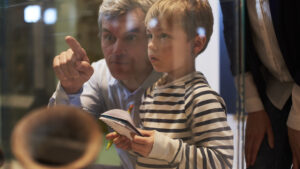Evanston is home to many significant museums. Read about the ones mentioned below, then plan your visit!
Block Museum of Art
The Block stands as a dynamic, imaginative, and inventive hub dedicated to education, learning, and research within Northwestern University and its adjacent communities. Its vibrant global exhibition program traverses various epochs and cultures, serving as a catalyst for thought-provoking dialogues that bear relevance to our present-day existence.
Furthermore, the museum actively encourages original artistic creation, fostering connections between artists and the public by engaging them in the creative process. Annually, the Block curates exhibitions and coordinates lectures, symposia, and workshops that involve artists, scholars, curators, and critics. It also hosts screenings of classic and contemporary films in its internal cinema.
The museum extends its influence to national and international realms through traveling exhibitions, publications, and digital initiatives. Its steadily expanding permanent collection, comprising around 6,000 pieces, primarily focuses on prints, photography, and drawings, representing a valuable cultural repository.
40 Arts Circle Dr, Evanston, IL 60208
(847) 491-4000
Fall 2023 Hours: Mon & Tue Closed, Wed – Fri 12 PM – 8 PM, Sat & Sun 12 PM – 5 PM
blockmuseum.northwestern.edu
Mitchell Museum of the American Indian
The land currently occupied by the Mitchell Museum is the ancestral territory of the Council of Three Fires: the Anishinaabeg (Ojibwe), Odawak (Odawa), and Bodéwadmik (Potawatomi) Nations. Additionally, numerous other Native Nations, including the Kiash Matchitiwuk (Menominee); Jiwere (Otoe), Nutachi (Missouria), and Baxoje (Iowas); Hoocąk (Winnebago/Ho-Chunk) Meshkwahkîha (Meskwaki); Asâkîwaki (Sauk); Myaamiaki (Miami), Waayaahtanwaki (Wea), and Peeyankihšiaki (Piankashaw); Kiikaapoi (Kickapoo); Inoka (Illini Confederacy), called this Northeastern Illinois region their home.
Centuries before European contact, this area held immense importance for Indigenous communities, serving as a hub for transportation, agriculture, trade, and commerce within the Great Lakes. The innovative achievements of these Indigenous societies and the intricate infrastructure they developed laid the groundwork for the eventual growth of Chicago into the bustling metropolis we know today.
Despite the painful history of forced removal, displacement, and oppression endured by the original inhabitants of this land, Chicago remains a haven for one of the largest Native communities in the United States, encompassing more than 150 Indigenous Nations from across North America. The vibrant presence of Chicago’s Indigenous community is a testament to their resilience, strength, and determination.
Through its mission, the Mitchell Museum pays homage to Indigenous communities’ survival and unwavering spirit. The museum is dedicated to fostering enhanced comprehension of Indigenous peoples and providing a platform to celebrate their diverse cultures, storied pasts, and ongoing contributions to contemporary society.
3001 Central Street Evanston, IL 60201
(847) 475-1030
Mon – Fri 10 AM – 5 PM, Sat 10 AM – 3 PM
mitchellmuseum.org
Francis Willard House Museum
Constructed in 1865, following a design attributed to Andrew J. Downing, this dwelling in Evanston became the residence of Frances Willard (1839-1898), a notable figure recognized for her literary contributions and activism.
Within these walls, Frances Willard resided and toiled throughout her tenure as the Woman’s Christian Temperance Union (WCTU) leader. During this period, the house also served as an informal hub for the WCTU on a national scale and provided accommodation for its staff.
Transformed into a museum in 1900, the Frances Willard House Museum boasts a remarkably well-preserved assortment of original furniture and artifacts. This collection encompasses furnishings, artworks, textiles, family portraits, books, and even Willard’s bicycle. Together, these pieces play a pivotal role in narrating the life story of one of the most influential advocates for social change in 19th-century America.
1730 Chicago Avenue, Evanston, IL 60201
Office Hours Thursdays, 9 AM – 3 PM
(847) 328-7500
franceswillardhouse.org
Evanston History Center
Recognizing the imminent threat of losing a significant portion of Evanston’s early history due to the passing of its earliest settlers, a coalition of seven residents took the initiative in 1898 to establish the Evanston History Center, previously known as the Evanston Historical Society.
In 1942, Charles Gates and Caro Dawes orchestrated an agreement with Northwestern University to safeguard their residence for the benefit of the Evanston History Center. Following the passing of Charles and Caro Dawes, the Evanston History Center relocated to the Dawes House in 1960.
In a pivotal development in 1976, the Charles Gates Dawes House garnered recognition as a National Historic Landmark.
In the contemporary landscape, the Center’s mission encompasses the accumulation, conservation, dissemination, and interpretation of the vibrant narrative of Evanston’s evolution. This is achieved through a combination of guided tours, exhibitions, educational initiatives, community gatherings, and the provision of research amenities.
225 Greenwood Street Evanston, IL 60201
(847) 475-3410
evanstonhistorycenter.org
Read about other excellent establishments in our blog and find them on our neighborhood map!






